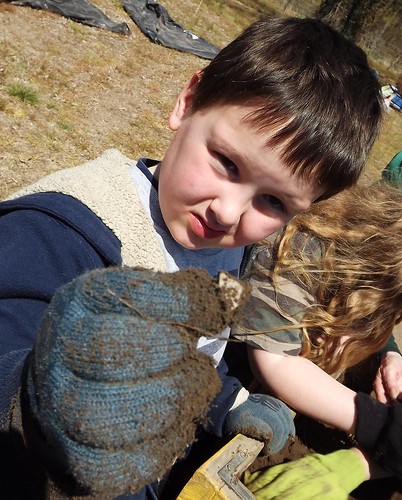Desha County 4-Her’s dig for clues to the past
By Emily Thompson
U of A System Division of Agriculture
Feb. 23, 2018
Fast Facts:
- Desha County 4-H archeology program featured in Journal of Community Archaeology & Heritage
- The program teaches the STEM fields through hands-on activities.
- 4-Her’s conducted their own archeological dig at the Hollywood Plantation in Drew County.
(469 words)
(with downloadable art at https://flic.kr/s/aHskh31H5T)
(Download this story in MS Word format here.)
MCGEHEE, Ark. – Just underneath the earth’s surface lie clues to Arkansas’ past and a group of citizen scientists and 4-Her’s in Desha County are doing their part to uncover those clues.
The Desha County 4-H Archeology Program, is a partnership between two parts of the University of Arkansas System: The Division of Agriculture and the Arkansas Archeological Survey. Through the Division of Agriculture’s Cooperative Extension Service, 4-H members learn the basics of archeology and are encouraged them to explore science and history with hands on activities and tours of archeological sites in the state.
“Everyone is a little bit curious about something, and I want to encourage that curiosity,” said Hope Bragg, Desha County staff chair and program creator.
In 2017, the club was featured in the “Journal of Community Archaeology & Heritage” for teaching 4-Her’s how to be citizen scientists. Citizen science is practiced when members of the general public conduct or contribute to scientific research.
Bragg said she was tickled, but not surprised when she heard about the journal article.
“I knew what we were doing was significant,” Bragg said.
The program combines community service and STEM education—two pillars of the 4-H mission. Club members use math, science and technology skills during activities and serve their communities through their research, by making what they learn about Arkansas history public.
“Citizen science is a form of community service,” Bragg said.
In the Field
The program started in 2014 with the 4-H Day of Archeology.
During the 4-H Day of Archeology, participants learned “how to think like a scientist,” said Bragg. 4-Her’s learn what to do if they find an artifact, how to analyze it and tour historic Arkansas sites. The program continued to grow in popularity, with 66 members participating in the 4-H Day of Archeology in two different locations.
The program expanded to include a week-long camp called From Field to Report where 4-H’ers ran their own archeological research at the historic Hollywood Plantation in Drew County. The campers developed a research question, excavated test units on the plantation and cleaned and cataloged the artifacts they found. They then analyzed their findings and published their findings in the Arkansas Archeological Society’s newsletter, Field Notes.
Bragg said that the From Field to Report program did more than teach the campers about archeology, it helped them develop new friendships and explore potential career paths.
“I had a child that when the program stated, he wouldn’t speak or communicate with anyone,” Bragg said. “By the end, he just opened up.”
Another 4-H’er plans on becoming an anthropologist after attending the camp.
Bragg said she hopes to see the 4-H archeology program become state-wide as a way to teach the STEM fields.
Bragg also said she’s proud of her 4-H archeologists and the accomplishments they have made while in the program.
“If you raise that bar high, they’ll strive to reach it,” Bragg said.
For more information about the 4-H Archeology Program, contact Hope Bragg by phone at 870-222-3972 or by email at hbragg@uada.edu.
About the Division of Agriculture
The University of Arkansas System Division of Agriculture’s mission is to strengthen agriculture, communities, and families by connecting trusted research to the adoption of best practices. Through the Agricultural Experiment Station and the Cooperative Extension Service, the Division of Agriculture conducts research and extension work within the nation’s historic land grant education system.
The Division of Agriculture is one of 20 entities within the University of Arkansas System. It has offices in all 75 counties in Arkansas and faculty on five system campuses.
Pursuant to 7 CFR § 15.3, the University of Arkansas System Division of Agriculture offers all its Extension and Research programs and services (including employment) without regard to race, color, sex, national origin, religion, age, disability, marital or veteran status, genetic information, sexual preference, pregnancy or any other legally protected status, and is an equal opportunity institution.
# # #
Media Contact: Mary Hightower
Dir. of Communication Services
U of A Division of Agriculture
Cooperative Extension Service
(501) 671-2126
mhightower@uada.edu
